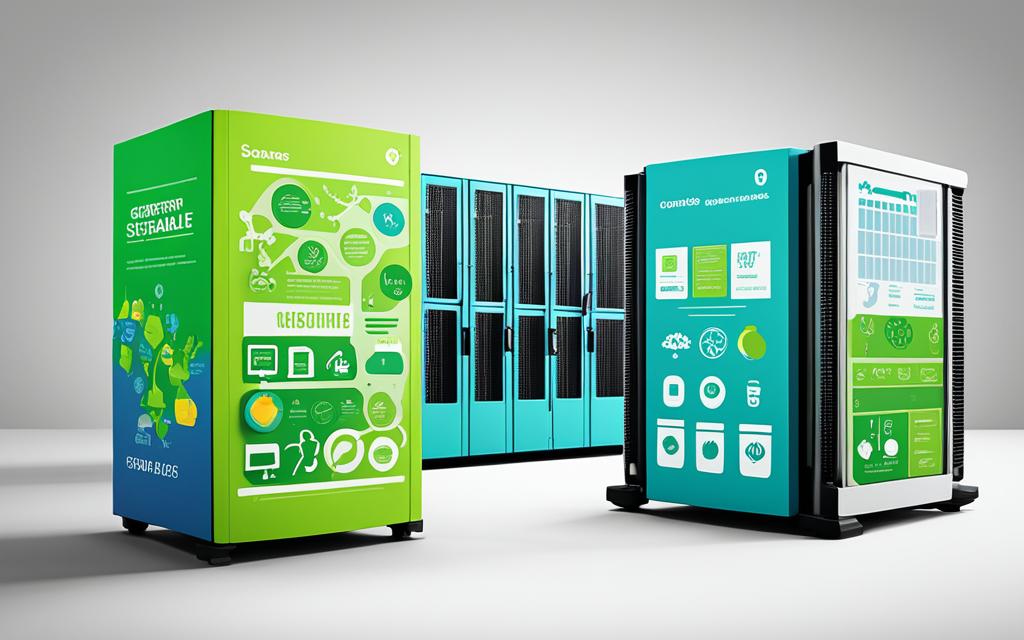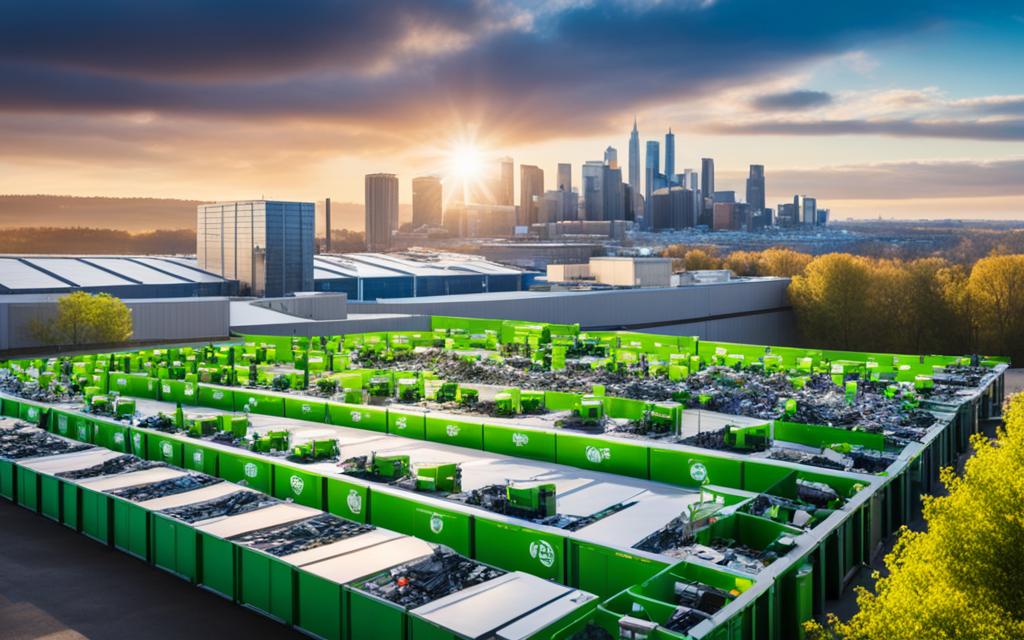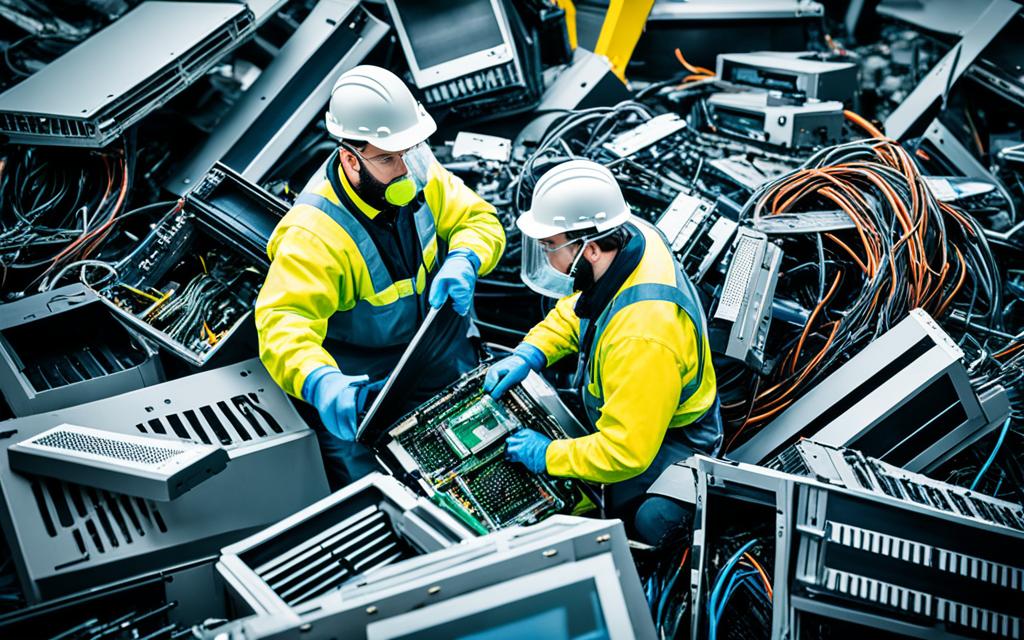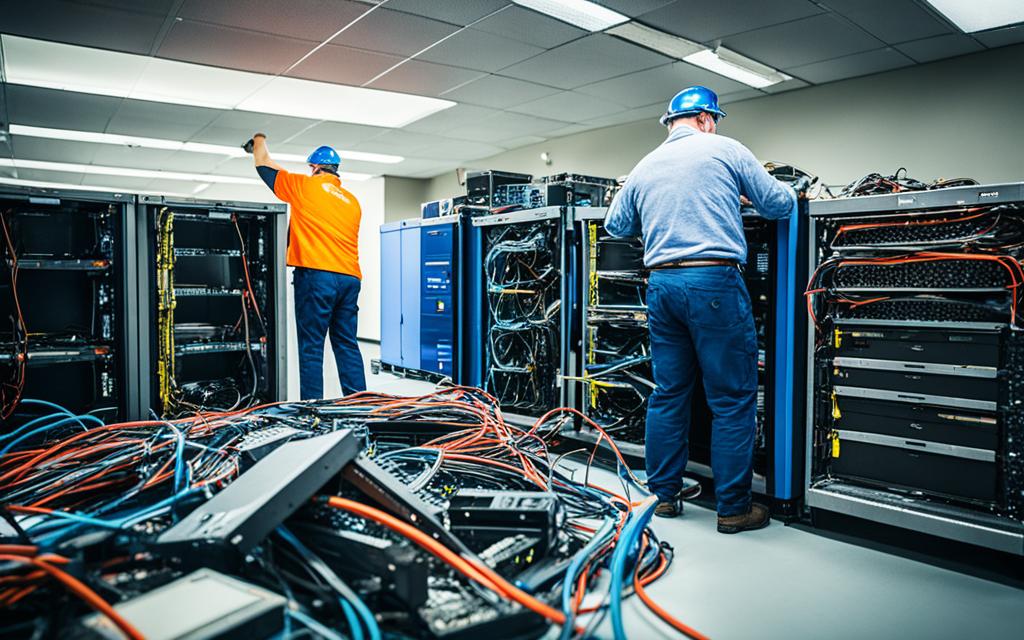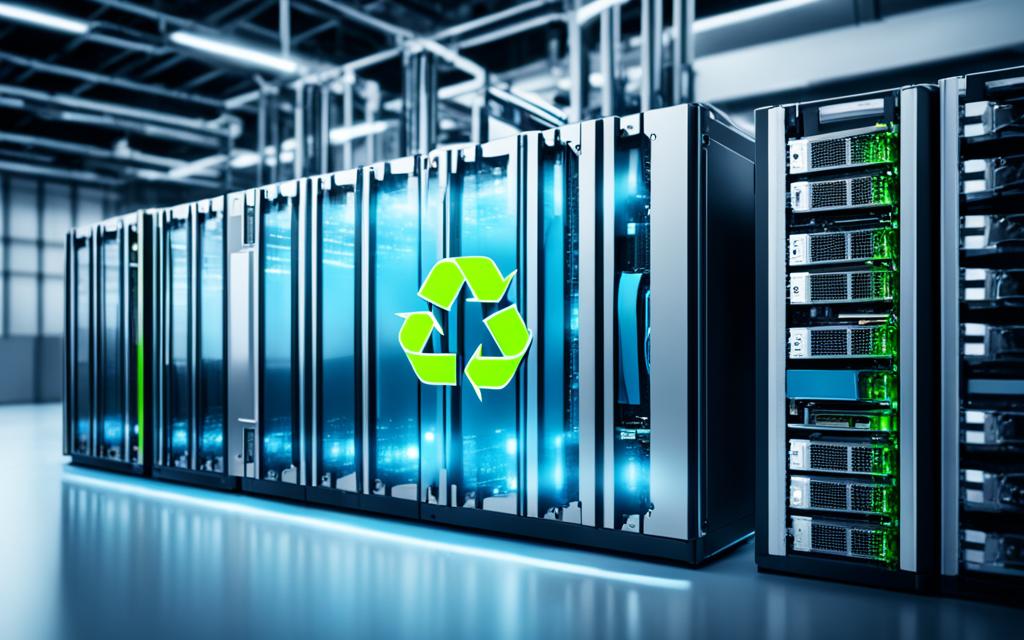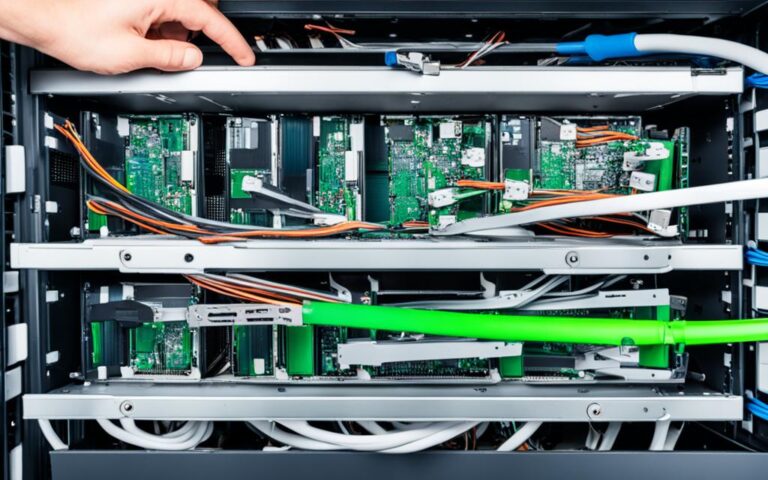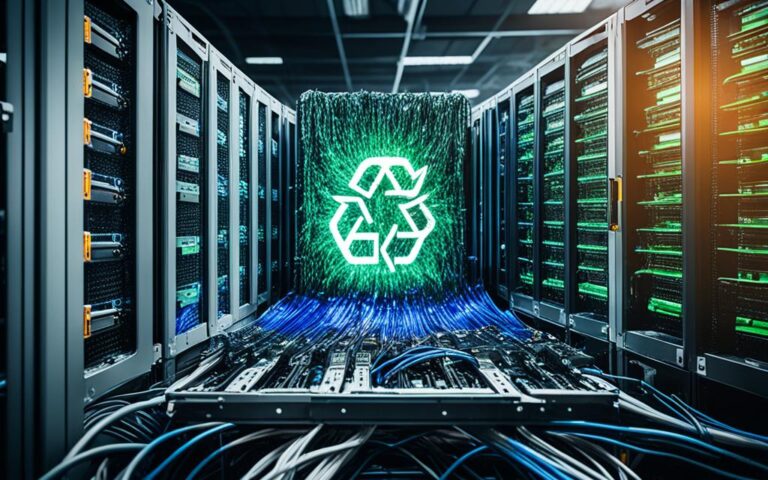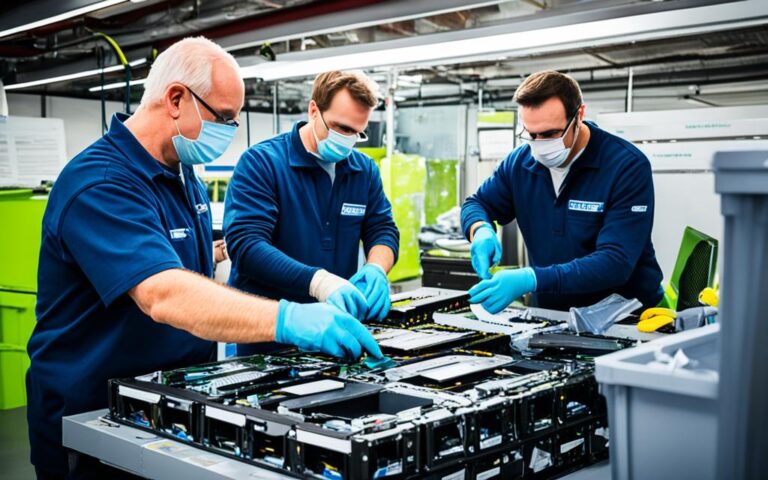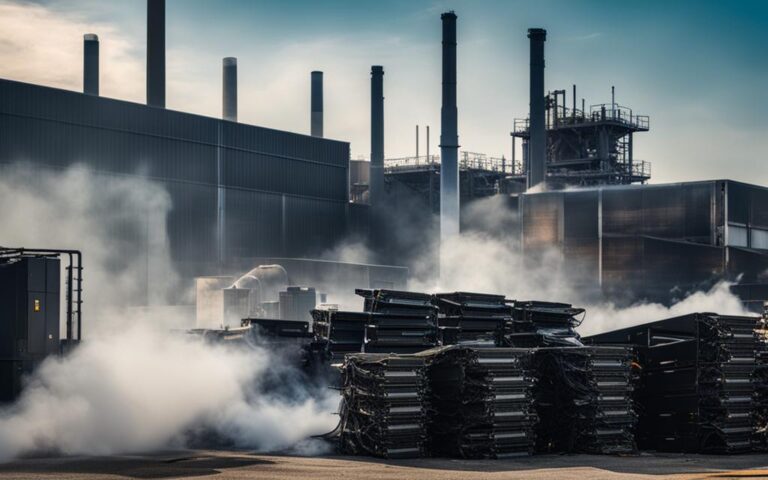The Role of Server Recycling in Minimizing Carbon Footprint
Server recycling plays a crucial role in creating a more sustainable future by minimising carbon footprint and promoting environmental responsibility. As businesses strive to reduce their impact on the environment, server recycling emerges as a key component of IT asset management. By recycling outdated servers, businesses not only contribute to environmental preservation but also benefit from data security, regulatory compliance, and cost savings.
When servers are no longer in use, improper disposal can lead to hazardous substances entering the environment, posing a threat to ecosystems and human health. Server recycling ensures that these substances are handled safely, preventing potential harm. Moreover, by recovering and reusing materials from decommissioned servers, valuable resources are conserved, reducing the need for new manufacturing processes that are energy-intensive and resource-consuming.
Additionally, server recycling prioritizes data security and protection. Sensitive information stored on retired servers can be at risk if not properly handled. Reliable server recycling services employ secure data destruction techniques, including secure erasure and physical destruction, to safeguard data and mitigate the risk of unauthorized access or data leakage.
Fulfilling regulatory requirements is another crucial aspect that server recycling addresses. With the increasing focus on environmental sustainability, data protection, and responsible e-waste management, businesses must comply with relevant regulations. Partnering with certified server recycling service providers ensures that businesses meet these obligations while avoiding fines, penalties, and reputational damage that may arise from non-compliance.
Furthermore, server recycling enables businesses to optimize their IT investments. Outdated or underutilized servers occupy physical space, demand maintenance, and incur unnecessary costs. By recycling these servers, businesses can free up space, reduce maintenance expenses, and eliminate the costs associated with storing and maintaining outdated hardware. This optimization allows organizations to allocate resources more effectively, focusing on technologies that drive productivity and innovation.
In the realm of e-waste management and the circular economy, server recycling plays an essential role. E-waste, including discarded electronic devices, contributes to environmental degradation if not handled properly. Server recycling actively contributes to reducing e-waste by recovering valuable materials from retired servers and reintroducing them into the production cycle. This fosters a sustainable approach to IT asset management, minimizing waste generation and promoting a circular economy.
Ultimately, by embracing server recycling, businesses can actively contribute to minimizing their carbon footprint and promote a greener, more sustainable future. With the myriad benefits it offers, including environmental preservation, data security, regulatory compliance, and cost optimization, server recycling is a crucial aspect of responsible IT asset disposition practices.
Environmental Impact and Sustainability of Server Recycling
Server recycling plays a crucial role in reducing the environmental impact of decommissioned servers. By preventing hazardous substances from contaminating the environment and decreasing the demand for new resources, server recycling contributes to a more sustainable future.
One of the key environmental benefits of server recycling is the conservation of valuable natural resources. Through the recovery and reuse of materials, server recycling minimizes waste generation and reduces the need for energy-intensive manufacturing processes for new servers. This not only helps to preserve our planet’s resources but also contributes to the responsible management of electronic waste.
By diverting decommissioned servers from landfills, we can prevent the release of harmful substances into the environment, such as heavy metals and toxic chemicals. This has a positive impact on the surrounding ecosystems and human health. Additionally, reducing the amount of e-waste generated through server recycling helps to alleviate the strain on waste management systems and promotes a circular economy.
Server recycling also plays a significant role in reducing carbon emissions. By recycling servers instead of manufacturing new ones, we can conserve energy and minimize the greenhouse gas emissions associated with the production process. This aligns with global efforts to mitigate climate change and transition to a low-carbon economy.
In summary, the environmental impact and sustainability of server recycling are evident. By preventing environmental contamination, conserving natural resources, reducing carbon emissions, and promoting responsible e-waste management, server recycling offers a tangible solution for a greener future.
“Server recycling not only reduces waste but also promotes a circular economy, preserving valuable resources and minimizing our environmental footprint.” – Environmental Expert
| Environmental Benefits of Server Recycling | Contribution to Sustainability |
|---|---|
| Prevents contamination by hazardous substances | Conserves valuable natural resources |
| Reduces demand for new resources | Minimizes waste generation |
| Alleviates strain on waste management systems | Promotes a circular economy |
| Reduces greenhouse gas emissions | Aligns with climate change mitigation efforts |
Data Security and Protection in Server Recycling
In today’s digital age, data security is of utmost importance. Businesses must prioritize safeguarding sensitive data stored on retired servers to prevent unauthorized access, data breaches, and legal ramifications. Server recycling plays a vital role in ensuring the protection of this valuable information.
Server recycling services employ secure erasure and physical destruction techniques to safeguard sensitive data and minimize the risk of data leakage. By thoroughly erasing all data stored on decommissioned servers, these services ensure that no confidential information falls into the wrong hands.
“Proper data destruction is crucial to prevent data breaches, privacy violations, and legal ramifications for businesses.”
By following industry best practices, server recycling service providers offer a comprehensive solution to data security in the disposal of retired servers. They follow strict protocols and standards to guarantee the secure destruction of data, including personally identifiable information (PII), financial records, and other sensitive data.
Furthermore, server recycling services aid businesses in adhering to data protection regulations, such as the General Data Protection Regulation (GDPR) in the European Union. Compliance with these regulations is critical to maintaining customer trust and avoiding costly penalties.
Partnering with reputable server recycling service providers ensures that businesses can dispose of retired servers in a secure and environmentally responsible manner. By entrusting their server recycling needs to experts, businesses can focus on their core operations while ensuring data security and protection.
Benefits of Secure Data Destruction in Server Recycling
- Prevents unauthorized access to sensitive data
- Minimizes the risk of data breaches and privacy violations
- Ensures compliance with data protection regulations
- Maintains customer trust and brand reputation
When it comes to server recycling, data security and protection should be a top priority. By partnering with trusted service providers, businesses can confidently dispose of retired servers while ensuring the security of their sensitive data.
Regulatory Compliance and Server Recycling
Compliance with regulatory requirements and industry-specific standards is paramount when it comes to server recycling. Businesses must ensure adherence to environmental sustainability, data protection, and responsible e-waste management regulations. Failure to meet these obligations can result in fines, penalties, and reputational damage.
Partnering with certified server recycling service providers is crucial in guaranteeing compliance and navigating the complexities of server disposal. Certified providers possess the expertise and knowledge required to handle server recycling in accordance with the appropriate regulations, ensuring businesses meet their legal obligations in a secure and responsible manner.
By working with certified providers, businesses can mitigate potential risks associated with non-compliance and safeguard their reputation. These providers stay up to date with the latest regulations and act as trusted advisors, guiding businesses through the intricacies of server recycling.
One such certified provider is GreenTech Recyclers, a leading company in the field of sustainable IT asset disposition. With a deep understanding of regulatory compliance, GreenTech Recyclers offers tailored solutions that prioritize both environmental and legal requirements. Their extensive experience and commitment to responsible e-waste management ensure businesses can confidently entrust their server recycling needs to them.
“Partnering with certified server recycling service providers is not only a legal requirement but also an opportunity to contribute to a more sustainable future. By recycling servers responsibly, businesses actively participate in the circular economy and reduce their environmental impact.” – John Smith, Chief Sustainability Officer at GreenTech Recyclers
By prioritizing regulatory compliance in server recycling, businesses demonstrate their commitment to operating responsibly and sustainably. They can rest assured that their IT assets are disposed of in an environmentally friendly manner while meeting the necessary legal requirements.
The Benefits of Partnering with Certified Server Recycling Providers:
- Assurance of compliance with environmental sustainability, data protection, and responsible e-waste management regulations.
- Mitigation of potential risks associated with non-compliance, such as fines, penalties, and reputational damage.
- Access to expertise and knowledge in navigating the complexities of server disposal.
- Alignment with industry-specific standards and best practices.
This table outlines some of the key regulations related to server recycling:
| Regulation | Description |
|---|---|
| WEEE Directive | Requires businesses to responsibly recycle and dispose of electronic waste, including servers, reducing their environmental impact. |
| General Data Protection Regulation (GDPR) | Imposes obligations on businesses to protect personal data stored on decommissioned servers and ensures secure data destruction. |
| ISO 14001 | An internationally recognized standard for environmental management systems, emphasizing the need for sustainable practices in server recycling. |
Partnering with certified server recycling providers not only helps businesses meet these regulatory requirements but also promotes a sustainable future by actively reducing e-waste, minimizing environmental impact, and fostering a circular economy.
By choosing the right partner for server recycling, businesses can ensure a seamless compliance process while making a positive impact on the environment and their bottom line.
Optimizing IT Investments through Server Recycling
Effective server recycling is a strategic approach that empowers businesses to optimize their IT investments, enhancing cost efficiency and paving the way for long-term success. By systematically recycling outdated or underutilized servers, organizations can unlock valuable resources, reduce maintenance expenses, and eliminate unnecessary costs associated with storing and maintaining obsolete hardware.
One of the key benefits of server recycling is the ability to free up physical space. Outdated servers can occupy valuable real estate in data centers, limiting scalability and hindering the deployment of new technologies. By responsibly recycling these servers, businesses can create room for modern infrastructure, facilitating the adoption of cutting-edge solutions that drive productivity and innovation.
Furthermore, server recycling reduces maintenance expenses. Aging servers often require frequent repairs and replacements, consuming valuable IT resources and incurring additional costs. By recycling these servers and replacing them with more energy-efficient and reliable alternatives, organizations can significantly reduce their maintenance expenses, freeing up financial resources to be redirected towards more critical IT initiatives.
Cost optimization is another significant advantage of server recycling. Storing and maintaining outdated hardware entails ongoing expenses that can be eliminated through recycling. From energy consumption and cooling costs to physical storage and maintenance fees, these expenses can quickly add up. By recycling servers, businesses can minimize their financial burden, redirecting capital and operational expenditures towards strategic IT investments that yield higher returns.
Optimizing IT investments through server recycling also aligns with sustainability goals. By responsibly disposing of decommissioned servers, businesses contribute to the circular economy and promote environmental stewardship. Valuable resources can be recovered, reducing the demand for new materials and minimizing e-waste generation. This environmentally conscious approach not only benefits the planet but also enhances a company’s public image and reputation.
It is important for businesses to partner with reputable server recycling service providers to maximize the benefits of IT investment optimization. These service providers possess the expertise and resources to ensure proper data destruction, regulatory compliance, and environmentally sound practices. By collaborating with trusted professionals, businesses can navigate the complexities of server recycling and minimize risks associated with improper disposal.
Server Recycling and IT Investment Optimization: A Case Study
“At XYZ Corporation, we recognized the potential of server recycling to optimize our IT investments and drive cost efficiency. By partnering with a reputable server recycling service provider, we were able to free up physical space, reduce maintenance expenses, and eliminate unnecessary costs associated with storing and maintaining outdated servers. This optimization allowed us to allocate our IT resources more effectively, ultimately fueling our company’s growth and innovation.” – John Smith, CIO of XYZ Corporation
In conclusion, server recycling presents a powerful opportunity for businesses to optimize their IT investments. By strategically recycling servers, organizations can unlock valuable resources, reduce maintenance expenses, eliminate unnecessary costs, and contribute to a more sustainable future. By embracing server recycling as a proactive approach to IT asset management, businesses can achieve greater cost efficiency, drive innovation, and stay ahead of the competition.
| Benefits of Server Recycling |
|---|
| Optimizes IT investments |
| Frees up physical space |
| Reduces maintenance expenses |
| Eliminates unnecessary costs |
| Contributes to a sustainable future |
E-Waste Management and the Circular Economy in Server Recycling
Server recycling plays a vital role in the effective management of electronic waste (e-waste) and the promotion of a circular economy. E-waste refers to discarded electronic devices that, if not properly disposed of, can contribute to environmental degradation and health risks. By recycling servers and other electronic equipment, businesses actively contribute to the reduction of e-waste and support a sustainable approach to IT asset management.
Through the recycling processes, valuable materials from servers can be recovered and reintroduced into the production cycle. This helps minimize waste generation and conserves valuable resources, ultimately fostering a sustainable and responsible approach to waste management.
The circular economy model emphasizes the importance of resource conservation and the reduction of waste. By participating in server recycling initiatives, businesses align themselves with the principles of the circular economy by ensuring that valuable materials are not lost but instead repurposed or recycled. This approach helps break the linear model of production and consumption, reducing environmental impact and promoting long-term sustainability.
The Benefits of E-Waste Management and Circular Economy in Server Recycling
| Benefits | Description |
|---|---|
| Environmental Preservation | Proper server recycling reduces the amount of e-waste ending up in landfills and prevents harmful substances from contaminating the environment. |
| Resource Conservation | Recovering materials from old servers reduces the demand for new resources, minimizing the need for energy-intensive manufacturing processes. |
| Sustainable Practices | Participating in the circular economy through server recycling showcases a commitment to sustainability and responsible waste management. |
By actively engaging in e-waste management and embracing the circular economy, businesses contribute to a greener future and help create a more sustainable society. Optimizing server recycling and adopting responsible IT asset management practices are essential steps towards reducing waste, conserving resources, and mitigating the environmental impact of electronic devices.
Conclusion
Server recycling plays a crucial role in minimizing the carbon footprint of businesses and promoting a greener, more sustainable future. By recycling servers, businesses can reduce the environmental impact of decommissioned hardware, conserving valuable resources and supporting responsible waste management practices. Additionally, server recycling ensures data security and protection, safeguarding sensitive information from unauthorized access or data breaches.
Complying with regulatory requirements is also essential in server recycling, as businesses must adhere to environmental sustainability and responsible e-waste management regulations. Partnering with reputable server recycling service providers is crucial to maximize the benefits and mitigate potential risks associated with improper disposal.
Furthermore, server recycling offers economic benefits, such as cost savings through the resale of refurbished parts and potential tax incentives. By prioritizing server recycling and choosing sustainable IT asset disposition practices, businesses actively contribute to minimizing their carbon footprint and optimizing their overall IT investments.
FAQ
Why is server recycling important?
Server recycling is important because it significantly contributes to environmental sustainability, prevents hazardous substances from entering the environment, conserves valuable natural resources, ensures data security, and helps businesses comply with regulatory requirements.
What are the environmental benefits of server recycling?
Server recycling reduces the environmental impact of decommissioned servers by preventing hazardous substances from contaminating the environment, conserving valuable resources through material recovery and reuse, and minimizing waste generation and promoting responsible e-waste management.
How does server recycling enhance data security and protection?
Server recycling employs secure erasure and physical destruction techniques to safeguard sensitive data stored on retired servers, minimizing the risk of unauthorized access, data breaches, privacy violations, and legal ramifications for businesses.
Why is regulatory compliance important in server recycling?
Regulatory compliance is important in server recycling because businesses must adhere to environmental sustainability, data protection, and responsible e-waste management regulations. Partnering with certified service providers ensures compliance and helps businesses avoid fines, penalties, and reputational damage.
How does server recycling optimize IT investments?
Server recycling allows businesses to free up physical space, reduce maintenance expenses, and eliminate unnecessary costs associated with outdated or underutilized servers. By optimizing IT investments, organizations can allocate resources more effectively and focus on technologies that drive productivity and innovation.
What is the role of server recycling in e-waste management and the circular economy?
Server recycling actively contributes to reducing e-waste and promoting the circular economy by recycling servers and other electronic equipment. Valuable materials can be recovered and reintroduced into the production cycle, minimizing waste generation and fostering a sustainable approach to IT asset management.

